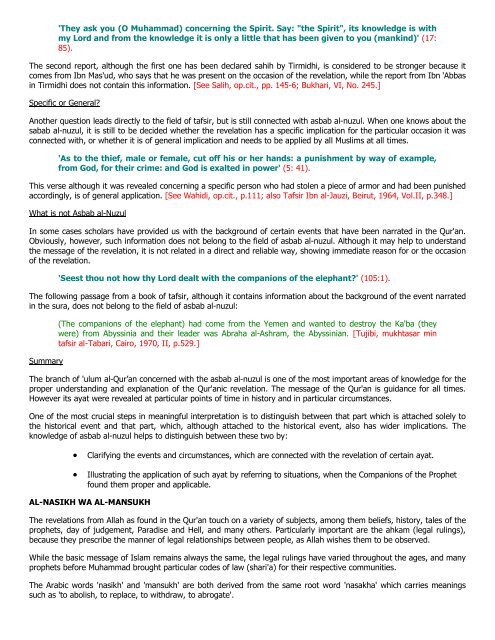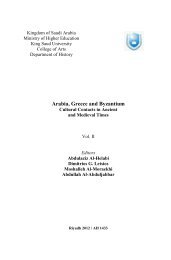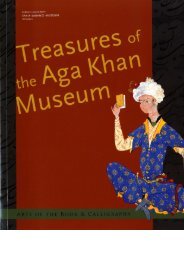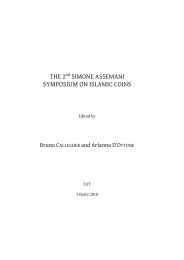ulum-al-quran
ulum-al-quran
ulum-al-quran
You also want an ePaper? Increase the reach of your titles
YUMPU automatically turns print PDFs into web optimized ePapers that Google loves.
'They ask you (O Muhammad) concerning the Spirit. Say: "the Spirit", its knowledge is with<br />
my Lord and from the knowledge it is only a little that has been given to you (mankind)' (17:<br />
85).<br />
The second report, <strong>al</strong>though the first one has been declared sahih by Tirmidhi, is considered to be stronger because it<br />
comes from Ibn Mas'ud, who says that he was present on the occasion of the revelation, while the report from Ibn 'Abbas<br />
in Tirmidhi does not contain this information. [See S<strong>al</strong>ih, op.cit., pp. 145-6; Bukhari, VI, No. 245.]<br />
Specific or Gener<strong>al</strong><br />
Another question leads directly to the field of tafsir, but is still connected with asbab <strong>al</strong>-nuzul. When one knows about the<br />
sabab <strong>al</strong>-nuzul, it is still to be decided whether the revelation has a specific implication for the particular occasion it was<br />
connected with, or whether it is of gener<strong>al</strong> implication and needs to be applied by <strong>al</strong>l Muslims at <strong>al</strong>l times.<br />
'As to the thief, m<strong>al</strong>e or fem<strong>al</strong>e, cut off his or her hands: a punishment by way of example,<br />
from God, for their crime: and God is ex<strong>al</strong>ted in power' (5: 41).<br />
This verse <strong>al</strong>though it was reve<strong>al</strong>ed concerning a specific person who had stolen a piece of armor and had been punished<br />
accordingly, is of gener<strong>al</strong> application. [See Wahidi, op.cit., p.111; <strong>al</strong>so Tafsir Ibn <strong>al</strong>-Jauzi, Beirut, 1964, Vol.II, p.348.]<br />
What is not Asbab <strong>al</strong>-Nuzul<br />
In some cases scholars have provided us with the background of certain events that have been narrated in the Qur'an.<br />
Obviously, however, such information does not belong to the field of asbab <strong>al</strong>-nuzul. Although it may help to understand<br />
the message of the revelation, it is not related in a direct and reliable way, showing immediate reason for or the occasion<br />
of the revelation.<br />
'Seest thou not how thy Lord de<strong>al</strong>t with the companions of the elephant' (105:1).<br />
The following passage from a book of tafsir, <strong>al</strong>though it contains information about the background of the event narrated<br />
in the sura, does not belong to the field of asbab <strong>al</strong>-nuzul:<br />
Summary<br />
(The companions of the elephant) had come from the Yemen and wanted to destroy the Ka'ba (they<br />
were) from Abyssinia and their leader was Abraha <strong>al</strong>-Ashram, the Abyssinian. [Tujibi, mukhtasar min<br />
tafsir <strong>al</strong>-Tabari, Cairo, 1970, II, p.529.]<br />
The branch of '<strong>ulum</strong> <strong>al</strong>-Qur’an concerned with the asbab <strong>al</strong>-nuzul is one of the most important areas of knowledge for the<br />
proper understanding and explanation of the Qur'anic revelation. The message of the Qur'an is guidance for <strong>al</strong>l times.<br />
However its ayat were reve<strong>al</strong>ed at particular points of time in history and in particular circumstances.<br />
One of the most cruci<strong>al</strong> steps in meaningful interpretation is to distinguish between that part which is attached solely to<br />
the historic<strong>al</strong> event and that part, which, <strong>al</strong>though attached to the historic<strong>al</strong> event, <strong>al</strong>so has wider implications. The<br />
knowledge of asbab <strong>al</strong>-nuzul helps to distinguish between these two by:<br />
<br />
<br />
Clarifying the events and circumstances, which are connected with the revelation of certain ayat.<br />
Illustrating the application of such ayat by referring to situations, when the Companions of the Prophet<br />
found them proper and applicable.<br />
AL-NASIKH WA AL-MANSUKH<br />
The revelations from Allah as found in the Qur'an touch on a variety of subjects, among them beliefs, history, t<strong>al</strong>es of the<br />
prophets, day of judgement, Paradise and Hell, and many others. Particularly important are the ahkam (leg<strong>al</strong> rulings),<br />
because they prescribe the manner of leg<strong>al</strong> relationships between people, as Allah wishes them to be observed.<br />
While the basic message of Islam remains <strong>al</strong>ways the same, the leg<strong>al</strong> rulings have varied throughout the ages, and many<br />
prophets before Muhammad brought particular codes of law (shari'a) for their respective communities.<br />
The Arabic words 'nasikh' and 'mansukh' are both derived from the same root word 'nasakha' which carries meanings<br />
such as 'to abolish, to replace, to withdraw, to abrogate'.





